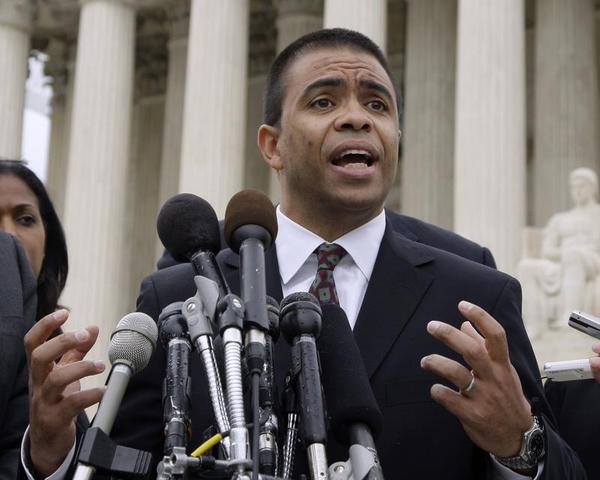
In a bipartisan vote, the Senate on Wednesday blocked President Obama’s controversial pick to head the Department of Justice’s civil rights division. It was the first defeat for the administration and Harry Reid under new rules pushed by the Senate majority leader last year requiring a simple majority vote on executive nominations.
Vice President Joe Biden was called to the Capitol ahead of what was expected to be a close vote in order to preside over the Senate and cast a tie-breaking ballot if necessary. Ultimately it wasn’t. Seven Democrats joined all Republicans in opposing Debo Adegbile’s confirmation, 52-47. (Reid switched his vote to no in a procedural move that allows him to bring the nomination back up again.)
The nomination had highly charged political implications. At issue was Adegbile’s past tenure as director of the NAACP’s Legal Defense Fund, which worked on behalf of Mumia Abu-Jamal, who was convicted in 1981 of killing Philadelphia police officer Daniel Faulkner. Abu-Jamal’s death sentence — though not his conviction — was eventually overturned.
Adegible’s nomination was opposed by the Fraternal Order of Police and the National Association of Police Organizations, which said the nominee “worked tirelessly to free this unrepentant cop-killer.”
Opposition garnered bipartisan support. Both of Pennsylvania’s senators, Democrat Bob Casey and Republican Pat Toomey, voted against the nomination.
“I respect that our system of law ensures the right of all citizens to legal representation no matter how heinous the crime. At the same time, it is important that we ensure that Pennsylvanians and citizens across the country have full confidence in their public representatives — both elected and appointed,” Casey said in a statement. “The vicious murder of Officer Faulkner in the line of duty and the events that followed in the 30 years since his death have left open wounds for Maureen Faulkner and her family as well as the City of Philadelphia.”
Delaware Sen. Chris Coons described his “no” vote as one of the most difficult he’s taken. He noted that, as a lawyer, he sympathized with the importance of legal advocacy, but said his decision was more about respecting the family’s concerns than about the nominee’s qualifications.
In a statement, the president called the rejection of Adegbile a “travesty based on wildly unfair character attacks against a good and qualified public servant.” He added that “the fact that his nomination was defeated solely based on his legal representation of a defendant runs contrary to a fundamental principle of our system of justice — and those who voted against his nomination denied the American people an outstanding public servant.”
Also in a statement, Attorney General Eric Holder expressed disappointment that Senate failed to confirm a “uniquely qualified nominee and an exceptional lawyer. He deserved to have his nomination considered wholly on the merits. His record was either misunderstood, or intentionally misrepresented for the sake of politics.”
Senate Judiciary Chairman Pat Leahy delivered a passionate defense of Adegible on the floor before the vote, citing the nominee’s expertise as head of the civil rights organization founded by Thurgood Marshall, and noting that the Legal Defense Fund took up the Abu-Jamal case before Adegible became its director.
“You listen to [Republicans] or you listen to Fox News, you might think the nominee himself is a criminal. Of course he’s not,” Leahy said. “Attacks launched against this nominee demonstrate a fundamental misunderstanding of the role of a lawyer and the path all police officers swear to serve and protect.”
Still, arguments made by Leahy, Reid, and Whip Dick Durbin were not enough to persuade the requisite number of Democrats. In addition to Casey and Coons, Sens. Heidi Heitkamp, Joe Manchin, Joe Donnelly, Mark Pryor, and John Walsh voted against the nomination.
Wednesday’s vote marked the first rejection of a White House nominee since Reid and Senate Democrats agreed in November to lower the threshold for filibusters on executive nominations from the traditional 60 to 51, after being frustrated by Republican efforts to block the president’s picks.
RCP White House correspondent Alexis Simendinger contributed to this report.
Senate Rejects Obama Nominee for Civil Rights Post
No comments:
Post a Comment